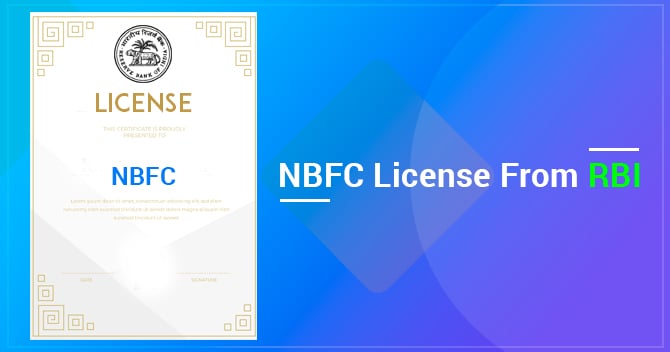The answer is yes; in general, every company engaged in financial activities as a principal business must obtain an NBFC license. Before going in-depth on how to obtain an NBFC license with Reserve Bank of India, we will discuss the concept of NBFC, Types of NBFC and Criteria to obtain an NBFC License.
Getting an NBFC License is a lengthy procedure, and the applicant is required to comply with the rules and regulations of RBI. NBFC provides long term and specialized credit facilities and attracts foreign grants. NBFCs facilitate all the banking related financial facilities. NBFC keep their services flexible to keep the services of the client updated and to meet the needs of the specific client.
NBFCs performs various functions like accepting deposits, delivering credit and plays a vital role in channelizing the inadequate financial resources to capital formation. The working of the NBFC is similar to the banking sector. They work with the aim to deliver the financial needs of the corporate sector as well as the weaker section of the society. Further, it also delivers credit to the unorganized sector and small local borrowers. In spite of being different from banks and their functions, NBFC is bound by the Indian banking industry rules and regulations.
NBFC is playing a vital role in economic development as well as in the rapid growth of the Indian economy. NBFCs are registered under the Companies Act 2013, before applying to the RBI for COR. The Companies dealing in financial activities must obtain an NBFC license with the Reserve Bank of India, as RBI has been controlling the financial activities of the Finance Companies (Non-Banking Financial Companies)
Exception – NBFC does not include services related to –
- Agriculture activity,
- Industrial activity,
- Selling, buying or erection of the immovable property.
What are the criteria for getting an NBFC license?
Before NBFC Registration, a company must be registered under the Companies Act 2013. The company should be passionate enough to commence the business in Non-banking financial institutions.
Before registering, it should comply with the following conditions:
- Commencement of business of non-banking financial institution should be defined under section 45I (a) of the RBI Act, 1934[1].
- It should be registered one as per the Companies Act 2013 of the Companies Act 1956.
- Minimum fund of Rs 2 crore.
Category of NBFCs
NBFCs are classified into 2 categories-
- (NBFC-D)-Deposit-taking Non-Banking Financial Company
- (NBFC-ND)-Non-Deposit taking Non-Banking Financial Company
What are the mandates for the companies to obtain an NBFC license with RBI?
In the context of compulsory registration of NBFCs with the Reserve Bank, Companies engaged in the financial activity as principal business, i.e. when the financial assets of the companies comprise of more than 50 % of the total assets and the income from financial assets amounts more than 50 % of the gross income shall obtain NBFC license with RBI. The Reserve Bank has defined the principal word business to check that the companies primarily involved in the financial activity get registered with the RBI and are also regulated and supervised by it.
Read our article:NBFC Registration: Step by Step Procedure
Financial Companies not requiring NBFC License
Below mentioned are the financial companies (NBFCs) that do not require registration and are not regulated by the RBI, but Reserve Bank issue commands related to the deposit acceptance activity-
- Mutual Benefit Finance Company
- Mutual Benefit Company
- Miscellaneous Non-Banking Companies (Chit-funds)
Companies exempted from NBFC License and RBI Regulation
Companies like Insurance Companies, Stock exchange, Merchant Banking companies, Housing Finance Companies, and Micro Finance Companies are exempted from RBI regulation which includes NBFC license.
Types of NBFCs in India
In India, NBFCs has resulted in various types to focus and cover the various sectors of the society-Types of NBFCs are-
- Investment and Credit Company
- Infrastructure Finance Company
- Systemically Important Core Investment Company (CIC-ND-SI)
- Infrastructure Debt Fund (Non- Banking Financial Company)
- Non-Banking Financial Company-Micro Finance Institution (NBFC-MFI)
- Non-Banking Financial Company – Factors (NBFC-Factors)
- Mortgage Guarantee Companies
- NBFC- Non-Operative Financial Holding Company.
How to obtain NBFC license?
The Process to obtain NBFC license–
The Applicant company applying for NBFC license has to comply with the following conditions for getting the COR (Certificate of registration), i.e. NBFC license-
- Incorporation of the company as per the norms prescribed in the Companies Act 2013 or the Companies Act 1956.
- After incorporation, the applicant needs to apply online for the NBFC license and submit a physical copy of an application to the Regional Office of the Reserve Bank of India along with the necessary documents. The application is submitted by the applicant online through COSMOS filing before filing the physical documentation to the RBI.
- Once you have a physical copy, the next step is to log in to the COSMOS and to fill the information regarding the application online and upload after filling up all the required details.
- Allocation of CARN number – When you are done with the submission of your application, the applicant receives Company Application Reference Number for the COR (Certificate of Recognition).
- Once the applicant gets his/her CARN, the applicant needs to submit the physical application form along with the requisite documents to the regional office. The ROC will send the documents to the head office after scrutinizing the form and documents.
- When the applicant is done with the submission of the supporting document and everything is found correct and approved by the regional office, the Head Office of RBI will then issue the COR-Certificate of Registration (NBFC license).
Compliances to be done Post COR
Once the NBFC license (COR) is granted by the RBI, the applicant company needs to follow the instruction issued by the RBI i.e.
- Membership from the Credit rating agencies (CIBIL, Equifax, Experian and CRIF Highmark), if the company is willing to get credit scoring from API, use Equifax.
- Electronic KYC Registration & Regular reporting of the borrowers.
- Financial Intelligence Unit Registration.
- CERSAI Registration
- Submission of financial information to information utility
- Income tax Returns.
- ROC Returns.
- Secretarial compliances.
- Statutory Audit and Tax Audit.
- File NBS-9 using Online Platform of RBI
What are the areas covered by NBFC?
NBFCs are playing an important part in the expansion of the infrastructure, employment generation, in the creation of wealth, economic growth, and especially considering the weaker sections of the society.
- NBFC helps in the growth of sectors like transport and infrastructure.
- Employment generation.
- Creation of wealth and economic development.
- Strengthening the weaker section of the society.
- Allowing foreign funding accepting the funding of financial markets
Systematic Important NBFCs – As per last audited balance sheet, NBFCs having asset size is of ₹ 500 crores or more are reviewed as systemically important as NBFCs. The systematic definition is that the activities of such NBFCs will have a bearing on the financial stability of the overall economy.
Summary at a Glance
The NBFC sector has grown well in the last few years and playing a critical role in a country which, as a result, will boost the economy in the right direction. The objective of NBFC is mainly to focus on the needs of the customer to build a strong connection. It is necessary for the NBFCs dealing with the financial activities as a principal business to get an NBFC license from the Reserve Bank of India. NBFC’s are termed as a game-changer for India’s economy, as it offers a wide range of financial services such as loans, chit funds etc.
Read our article:Are you running an NBFC? Get updated about the list of Annual Compliances Prescribed by the RBI











